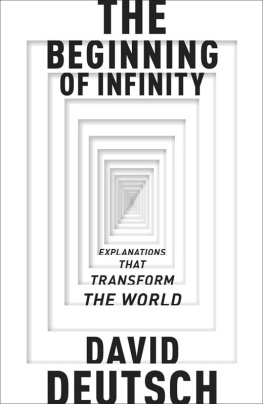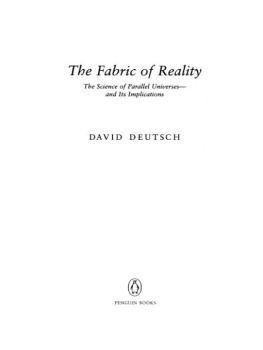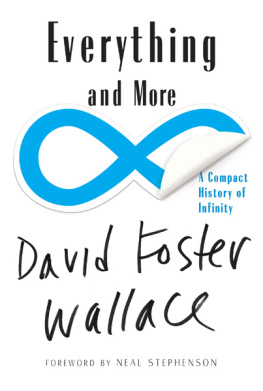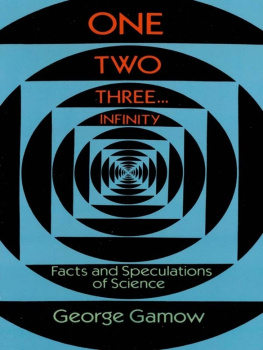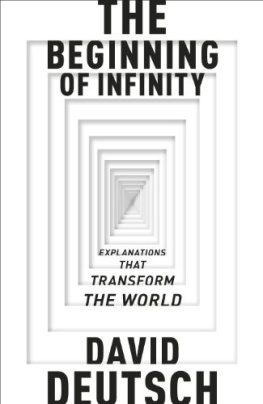David Deutsch - The Beginning of Infinity: Explanations That Transform the World
Here you can read online David Deutsch - The Beginning of Infinity: Explanations That Transform the World full text of the book (entire story) in english for free. Download pdf and epub, get meaning, cover and reviews about this ebook. year: 2011, publisher: Allen Lane, genre: Science. Description of the work, (preface) as well as reviews are available. Best literature library LitArk.com created for fans of good reading and offers a wide selection of genres:
Romance novel
Science fiction
Adventure
Detective
Science
History
Home and family
Prose
Art
Politics
Computer
Non-fiction
Religion
Business
Children
Humor
Choose a favorite category and find really read worthwhile books. Enjoy immersion in the world of imagination, feel the emotions of the characters or learn something new for yourself, make an fascinating discovery.
- Book:The Beginning of Infinity: Explanations That Transform the World
- Author:
- Publisher:Allen Lane
- Genre:
- Year:2011
- Rating:4 / 5
- Favourites:Add to favourites
- Your mark:
- 80
- 1
- 2
- 3
- 4
- 5
The Beginning of Infinity: Explanations That Transform the World: summary, description and annotation
We offer to read an annotation, description, summary or preface (depends on what the author of the book "The Beginning of Infinity: Explanations That Transform the World" wrote himself). If you haven't found the necessary information about the book — write in the comments, we will try to find it.
David Deutsch: author's other books
Who wrote The Beginning of Infinity: Explanations That Transform the World? Find out the surname, the name of the author of the book and a list of all author's works by series.
The Beginning of Infinity: Explanations That Transform the World — read online for free the complete book (whole text) full work
Below is the text of the book, divided by pages. System saving the place of the last page read, allows you to conveniently read the book "The Beginning of Infinity: Explanations That Transform the World" online for free, without having to search again every time where you left off. Put a bookmark, and you can go to the page where you finished reading at any time.
Font size:
Interval:
Bookmark:
I am grateful to my friends and colleagues Sarah Fitz-Claridge, Alan Forrester, Herbert Freudenheim, David Johnson-Davies, Paul Tappenden and especially Elliot Temple and my copy-editor, Bob Davenport, for reading earlier drafts of this book and suggesting many corrections and improvements, and also to those who have read and helpfully commented on parts of it, namely Omri Ceren, Artur Ekert, Michael Golding, Alan Grafen, Ruti Regan, Simon Saunders and Lulie Tanett.
I also want to thank the illustrators Nick Lockwood, Tommy Robin and Lulie Tanett for translating explanations into images more accurately than I could have hoped for.
Jacob Bronowski, The Ascent of Man (BBC Publications, 1973)
Jacob Bronowski, Science and Human Values (Harper & Row, 1956)
Richard Byrne, Imitation as Behaviour Parsing, Philosophical Transactions of the Royal Society B358 (2003)
Richard Dawkins, The Selfish Gene (Oxford University Press, 1976)
David Deutsch, Comment on Michael Lockwood, Many Minds Interpretations of Quantum Mechanics, British Journal for the Philosophy of Science 47, 2 (1996)
David Deutsch, The Fabric of Reality (Allen Lane, 1997)
Karl Popper, Conjectures and Refutations (Routledge, 1963)
Karl Popper, The Open Society and Its Enemies (Routledge, 1945)
John Barrow and Frank Tipler, The Anthropic Cosmological Principle (Clarendon Press, 1986)
Susan Blackmore, The Meme Machine (Oxford University Press, 1999)
Nick Bostrom, Are You Living in a Computer Simulation?, Philosophical Quarterly 53 (2003)
David Deutsch, Apart from Universes, in S. Saunders, J. Barrett, A. Kent and D. Wallace, eds., Many Worlds?: Everett, Quantum Theory, and Reality (Oxford University Press, 2010)
David Deutsch, It from Qubit, in John Barrow, Paul Davies and Charles Harper, eds., Science and Ultimate Reality (Cambridge University Press, 2003)
David Deutsch, Quantum Theory of Probability and Decisions, Proceedings of the Royal Society A455 (1999)
David Deutsch, The Structure of the Multiverse, Proceedings of the Royal Society A458 (2002)
Richard Feynman, The Character of Physical Law (BBC Publications, 1965)
Richard Feynman, The Meaning of It All (Allen Lane, 1998)
Ernest Gellner, Words and Things (Routledge & Kegan Paul, 1979)
William Godwin, Enquiry Concerning Political Justice (1793)
Douglas Hofstadter, Gdel, Escher, Bach: An Eternal Golden Braid (Basic Books, 1979)
Douglas Hofstadter, I am a Strange Loop (Basic Books, 2007)
Bryan Magee, Popper (Fontana, 1973)
Pericles, Funeral Oration
Plato, Euthyphro
Karl Popper, In Search of a Better World (Routledge, 1995)
Karl Popper, The World of Parmenides (Routledge, 1998)
Roy Porter, Enlightenment: Britain and the Creation of the Modern World (Allen Lane, 2000)
Martin Rees, Just Six Numbers (Basic Books, 2001)
Alan Turing, Computing Machinery and Intelligence, Mind, 59, 236 (October 1950)
Jenny Uglow, The Lunar Men (Faber, 2002)
Vernor Vinge, The Coming Technological Singularity, Whole Earth Review, winter 1993
Behind it all is surely an idea so simple, so beautiful, that when we grasp it in a decade, a century, or a millennium we will all say to each other, how could it have been otherwise?
John Archibald Wheeler, Annals of the New York Academy of Sciences, 480 (1986)
To unaided human eyes, the universe beyond our solar system looks like a few thousand glowing dots in the night sky, plus the faint, hazy streaks of the Milky Way. But if you ask an astronomer what is out there in reality, you will be told not about dots or streaks, but about stars: spheres of incandescent gas millions of kilometres in diameter and light years away from us. You will be told that the sun is a typical star, and looks different from the others only because we are much closer to it though still some million kilometres away. Yet, even at those unimaginable distances, we are confident that we know what makes stars shine: you will be told that they are powered by the nuclear energy released by transmutation the conversion of one chemical element into another (mainly hydrogen into helium).
Some types of transmutation happen spontaneously on Earth, in the decay of radioactive elements. This was first demonstrated in 1901, by the physicists Frederick Soddy and Ernest Rutherford, but the concept of transmutation was ancient. Alchemists had dreamed for centuries of transmuting base metals, such as iron or lead, into gold. They never came close to understanding what it would take to achieve that, so they never did so. But scientists in the twentieth century did. And so do stars, when they explode as supernovae. Base metals can be transmuted into gold by stars, and by intelligent beings who understand the processes that power stars, but by nothing else in the universe.
As for the Milky Way, you will be told that, despite its insubstantial appearance, it is the most massive object that we can see with the naked eye: a galaxy that includes stars by the hundreds of billions, bound by their mutual gravitation across tens of thousands of light years. We are seeing it from the inside, because we are part of it. You will be told that, although our night sky appears serene and largely changeless, the universe is seething with violent activity. Even a typical star converts millions of tonnes of mass into energy every second, with each gram releasing as much energy as an atom bomb. You will be told that within the range of our best telescopes, which can see more galaxies than there are stars in our galaxy, there are several supernova explosions per second, each briefly brighter than all the other stars in its galaxy put together. We do not know where life and intelligence exist, if at all, outside our solar system, so we do not know how many of those explosions are horrendous tragedies. But we do know that a supernova devastates all the planets that may be orbiting it, wiping out all life that may exist there including any intelligent beings, unless they have technology far superior to ours. Its neutrino radiation alone would kill a human at a range of billions of kilometres, even if that entire distance were filled with lead shielding. Yet we owe our existence to supernovae: they are the source, through transmutation, of most of the elements of which our bodies, and our planet, are composed.
There are phenomena that outshine supernovae. In March 2008 an X-ray telescope in Earth orbit detected an explosion of a type known as a gamma-ray burst, 7.5 billion light years away. That is halfway across the known universe. It was probably a single star collapsing to form a black hole an object whose gravity is so intense that not even light can escape from its interior. The explosion was intrinsically brighter than a million supernovae, and would have been visible with the naked eye from Earth though only faintly and for only a few seconds, so it is unlikely that anyone here saw it. Supernovae last longer, typically fading on a timescale of months, which allowed astronomers to see a few in our galaxy even before the invention of telescopes.
Another class of cosmic monsters, the intensely luminous objects known as quasars, are in a different league. Too distant to be seen with the naked eye, they can outshine a supernova for millions of years at a time. They are powered by massive black holes at the centres of galaxies, into which entire stars are falling up to several per day for a large quasar shredded by tidal effects as they spiral in. Intense magnetic fields channel some of the gravitational energy back out in the form of jets of high-energy particles, which illuminate the surrounding gas with the power of a trillion suns.
Font size:
Interval:
Bookmark:
Similar books «The Beginning of Infinity: Explanations That Transform the World»
Look at similar books to The Beginning of Infinity: Explanations That Transform the World. We have selected literature similar in name and meaning in the hope of providing readers with more options to find new, interesting, not yet read works.
Discussion, reviews of the book The Beginning of Infinity: Explanations That Transform the World and just readers' own opinions. Leave your comments, write what you think about the work, its meaning or the main characters. Specify what exactly you liked and what you didn't like, and why you think so.

